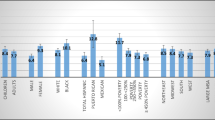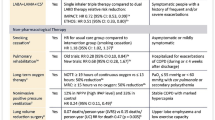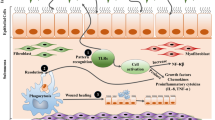Abstract
Purpose
Many studies have shown that chitinase-3-like protein 1 (CHI3L1), also known as YKL-40, is associated with asthma. The purpose of this meta-analysis was to evaluate the role of serum YKL-40 in the diagnosis and differential diagnosis of asthma, severity grading, and determination of disease state.
Methods
The PubMed, Ovid, and Cochrane databases were searched. A total of 17 articles involving 5696 subjects were included in this meta-analysis.
Results
The results showed that the level of YKL-40 was significantly higher in asthmatic patients than in the normal group regardless of age and residential location, and increased with severity and acute exacerbation (p < 0.05). YKL-40 levels were significantly different between chronic obstructive pulmonary disease (COPD) and asthma, and also between asthma-COPD overlap syndrome (ACO) and asthma (p < 0.05).
Conclusion
YKL-40 may act as a potential serological marker for the diagnosis of asthma, assessment of severity, indicator of the disease state, and differential diagnosis of COPD, ACO, and asthma.







Similar content being viewed by others
Data availability
All the data can be requested from the corresponding author upon reasonable request.
Code availability
Not applicable.
References
Boot RG, Blommaart EF, Swart E et al (2001) Identification of a novel acidic mammalian chitinase distinct from chitotriosidase[J]. J Biol Chem 276(9):6770–6778
Dickey BF (2007) Exoskeletons and exhalation[J]. N Engl J Med 357(20):2082–2084
Leung TF, Ching KW, Sy HY et al (2010) CHIA confers susceptibility to childhood eczema[J]. Br J Dermatol 163(6):1360–1362
Lin HW, Chiang YC, Sun NY et al (2019) CHI3L1 results in poor outcome of ovarian cancer by promoting properties of stem-like cells[J]. Endocr Relat Cancer 26(1):73–88
Furuhashi K, Suda T, Nakamura Y et al (2010) Increased expression of YKL-40, a chitinase-like protein, in serum and lung of patients with idiopathic pulmonary fibrosis[J]. Respir Med 104(8):1204–1210
Kuepper M, Bratke K, Virchow JC (2008) Chitinase-like protein and asthma[J]. N Engl J Med 358(10):1073–1075, 1075
Wang J, Lv H, Luo Z et al (2018) Plasma YKL-40 and NGAL are useful in distinguishing ACO from asthma and COPD[J]. Respir Res 19(1):47
Specjalski K, Chelminska M, Jassem E (2015) YKL-40 protein correlates with the phenotype of asthma[J]. Lung 193(2):189–194
Gomez JL, Crisafi GM, Holm CT et al (2015) Genetic variation in chitinase 3-like 1 (CHI3L1) contributes to asthma severity and airway expression of YKL-40[J]. J Allergy Clin Immunol 136(1):51–58
Kim SH, Choi H, Yoon MG et al (2015) Dipeptidyl-peptidase 10 as a genetic biomarker for the aspirin-exacerbated respiratory disease phenotype[J]. Ann Allergy Asthma Immunol 114(3):208–213
Chupp GL, Lee CG, Jarjour N et al (2007) A chitinase-like protein in the lung and circulation of patients with severe asthma[J]. N Engl J Med 357(20):2016–2027
Tang H, Fang Z, Sun Y et al (2010) YKL-40 in asthmatic patients, and its correlations with exacerbation, eosinophils and immunoglobulin E[J]. Eur Respir J 35(4):757–760
Specjalski K, Jassem E (2011) YKL-40 protein is a marker of asthma[J]. J Asthma 48(8):767–772
Konradsen JR, James A, Nordlund B et al (2013) The chitinase-like protein YKL-40: a possible biomarker of inflammation and airway remodeling in severe pediatric asthma[J]. J Allergy Clin Immunol 132(2):328–335
Kim HR, Jun CD, Lee KS et al (2012) Levels of YKL-40 in pleural effusions and blood from patients with pulmonary or pleural disease[J]. Cytokine 58(3):336–343
Duru S, Yuce G, Ulasli SS et al (2013) The relationship between serum YKL-40 levels and severity of asthma[J]. Iran J Allergy Asthma Immunol 12(3):247–253
Tsai Y, Ko Y, Huang M et al (2014) CHI3L1 polymorphisms associate with asthma in a Taiwanese population[J]. BMC Med Genet 15:86
Shirai T, Hirai K, Gon Y et al (2019) Combined assessment of serum periostin and YKL-40 may identify asthma-COPD overlap[J]. J Allergy Clin Immunol Pract 7(1):134–145
Han SS, Lee WH, Hong Y et al (2016) Comparison of serum biomarkers between patients with asthma and with chronic obstructive pulmonary disease[J]. J Asthma 53(6):583–588
El BN, Osman HM, Abdelaal AA et al (2018) Increased expression of serum periostin and YKL40 in children with severe asthma and asthma exacerbation[J]. J Investig Med 66(8):1102–1108
Gon Y, Maruoka S, Ito R et al (2017) Utility of serum YKL-40 levels for identification of patients with asthma and COPD[J]. Allergol Int 66(4):624–626
Santos CB, Davidson J, Covar RA et al (2014) The chitinase-like protein YKL-40 is not a useful biomarker for severe persistent asthma in children[J]. Ann Allergy Asthma Immunol 113(3):263–266
James AJ, Reinius LE, Verhoek M et al (2016) Increased YKL-40 and chitotriosidase in asthma and chronic obstructive pulmonary disease[J]. Am J Respir Crit Care Med 193(2):131–142
Rathcke CN, Johansen JS, Vestergaard H (2006) YKL-40, a biomarker of inflammation, is elevated in patients with type 2 diabetes and is related to insulin resistance[J]. Inflamm Res 55(2):53–59
Bara I, Ozier A, Girodet PO et al (2012) Role of YKL-40 in bronchial smooth muscle remodeling in asthma[J]. Am J Respir Crit Care Med 185(7):715–722
Tang H, Sun Y, Shi Z et al (2013) YKL-40 induces IL-8 expression from bronchial epithelium via MAPK (JNK and ERK) and NF-kappaB pathways, causing bronchial smooth muscle proliferation and migration[J]. J Immunol 190(1):438–446
Iwata T, Kuwajima M, Sukeno A et al (2009) YKL-40 secreted from adipose tissue inhibits degradation of type I collagen[J]. Biochem Biophys Res Commun 388(3):511–516
Bigg HF, Wait R, Rowan AD et al (2006) The mammalian chitinase-like lectin, YKL-40, binds specifically to type I collagen and modulates the rate of type I collagen fibril formation[J]. J Biol Chem 281(30):21082–21095
Zhu Z, Zheng T, Homer RJ et al (2004) Acidic mammalian chitinase in asthmatic Th2 inflammation and IL-13 pathway activation[J]. Science 304(5677):1678–1682
Lee CG, Hartl D, Lee GR et al (2009) Role of breast regression protein 39 (BRP-39)/chitinase 3-like-1 in Th2 and IL-13-induced tissue responses and apoptosis[J]. J Exp Med 206(5):1149–1166
Matsuura H, Hartl D, Kang MJ et al (2011) Role of breast regression protein-39 in the pathogenesis of cigarette smoke-induced inflammation and emphysema[J]. Am J Respir Cell Mol Biol 44(6):777–786
Kanazawa J, Kitazawa H, Masuko H et al (2019) A cis-eQTL allele regulating reduced expression of CHI3L1 is associated with late-onset adult asthma in Japanese cohorts[J]. BMC Med Genet 20(1):58
Liu L, Zhang X, Liu Y et al (2019) Chitinase-like protein YKL-40 correlates with inflammatory phenotypes, anti-asthma responsiveness and future exacerbations[J]. Respir Res 20(1):95
Ahangari F, Sood A, Ma B et al (2015) Chitinase 3-like-1 regulates both visceral fat accumulation and asthma-like Th2 inflammation[J]. Am J Respir Crit Care Med 191(7):746–757
Sohn MH, Lee JH, Kim KW et al (2009) Genetic variation in the promoter region of chitinase 3-like 1 is associated with atopy[J]. Am J Respir Crit Care Med 179(6):449–456
Zhu Y, Yan X, Zhai C et al (2017) Association between risk of asthma and gene polymorphisms in CHI3L1 and CHIA: a systematic meta-analysis[J]. BMC Pulm Med 17(1):193
Ober C, Tan Z, Sun Y et al (2008) Effect of variation in CHI3L1 on serum YKL-40 level, risk of asthma, and lung function[J]. N Engl J Med 358(16):1682–1691
Cunningham J, Basu K, Tavendale R et al (2011) The CHI3L1 rs4950928 polymorphism is associated with asthma-related hospital admissions in children and young adults[J]. Ann Allergy Asthma Immunol 106(5):381–386
Li K, Chen Z, Qin Y et al (2019) Plasm YKL-40 levels are associated with hypertension in patients with obstructive sleep apnea[J]. Biomed Res Int 2019:5193597
Mutlu LC, Tulubas F, Alp R et al (2017) Serum YKL-40 level is correlated with apnea hypopnea index in patients with obstructive sleep apnea syndrome[J]. Eur Rev Med Pharmacol Sci 21(18):4161–4166
Ragnoli B, Pochetti P, Raie A et al (2021) Interrelationship between obstructive sleep apnea syndrome and severe asthma: from endo-phenotype to clinical aspects[J]. Front Med (Lausanne) 8:640636
Peng J, Yu Q, Fan S et al (2021) High blood eosinophil and YKL-40 levels, as well as low CXCL9 levels, are associated with increased readmission in patients with acute exacerbation of chronic obstructive pulmonary disease[J]. Int J Chron Obstruct Pulmon Dis 16:795–806
Hozumi H, Fujisawa T, Enomoto N et al (2017) Clinical utility of YKL-40 in polymyositis/dermatomyositis-associated interstitial lung disease[J]. J Rheumatol 44(9):1394–1401
Yang X, Sheng G (2018) YKL-40 levels are associated with disease severity and prognosis of viral pneumonia, but not available in bacterial pneumonia in children[J]. BMC Pediatr 18(1):381
Schultz NA, Johansen JS (2010) YKL-40-a protein in the field of translational medicine: a role as a biomarker in cancer patients?[J]. Cancers (Basel) 2(3):1453–1491
Author information
Authors and Affiliations
Corresponding author
Ethics declarations
Ethics approval
Not applicable.
Consent to participate
Not applicable.
Consent for publication
None.
Conflict of interest
The authors declare no competing interests.
Additional information
Publisher’s note
Springer Nature remains neutral with regard to jurisdictional claims in published maps and institutional affiliations.
Comment
The quest for a reliable biomarker for asthma, which can clearly confirm the diagnosis, indicate when exacerbations occur and differentiate from other common diseases with similar symptoms, has been so far unanswered.
The meta-analysis done by Yihan Jin et al. explores the role of YKL-40 as a biomarker for asthma. Analysis of 5696 subjects from 17 studies demonstrates the utility of YKL-40 in diagnosis of asthma, in assessing the severity of asthma and asthma exacerbation. YKL-40 demonstrates statistically significant difference between controls and asthmatics. However, its role has still not clearly emerged for differentiating asthma from COPD, where YKL-40 levels are higher, or from asthma COPD overlap (ACO).
This meta-analysis shines light on the important fact that more studies need to be conducted before we can draw conclusions on the relevance of YKL-40 levels in asthma.
Uma Devaraj
Bangalore, India
Rights and permissions
About this article
Cite this article
Jin, Y., Song, J., Xu, F. et al. Association between YKL-40 and asthma: a systematic meta-analysis. Sleep Breath 26, 1011–1022 (2022). https://doi.org/10.1007/s11325-021-02495-w
Received:
Revised:
Accepted:
Published:
Issue Date:
DOI: https://doi.org/10.1007/s11325-021-02495-w




